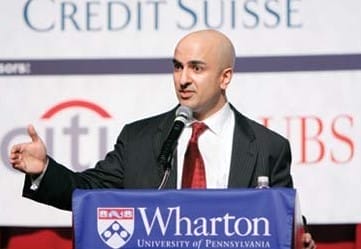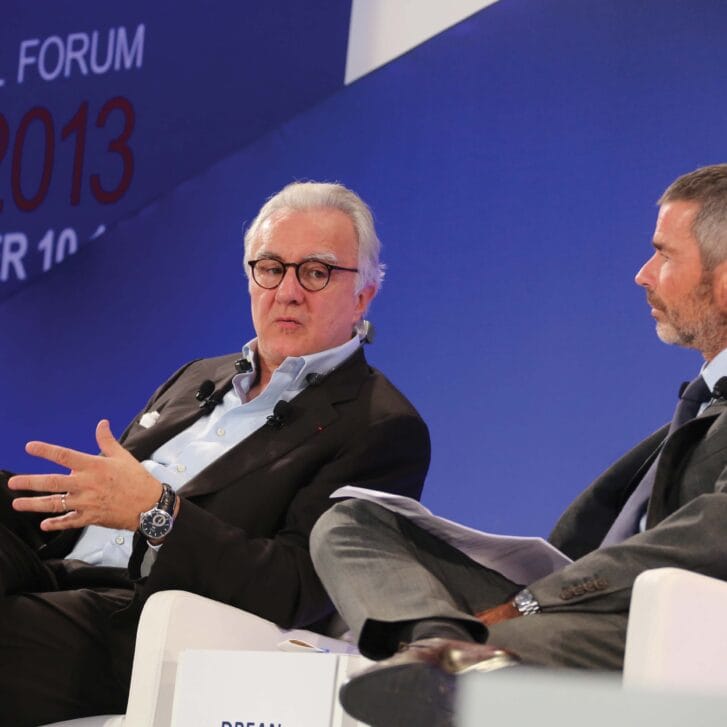A new course, “The Economic & Financial Crisis: Causes, Consequences and Policy Options” has launched in the Spring 2009 semester to unpack the current economic crisis as it evolves. Under the leadership of professor Mauro Guillen, the class will explore links between macroeconomics, central bank policy, and the complex financial instruments that contributed to growth and then a spectacular collapse in many global markets.
Guillen developed the course in October following the bankruptcy of Wall Street’s Lehman Brothers Holdings. The course’s 300 available slots were filled within 48 hours.
“When something as momentous and historically important is going on in the world as this crisis, we felt we should do something about it,” Guillen told Reuters. Wharton wants “students to have a sophisticated understanding of how complex the crisis is. There are so many moving parts.”
While Guillen is leading the course, other faculty will contribute lectures, including Jeremy Siegel on stock markets, Jennifer Amyx, a political science scholar on Japan’s financial crisis, Bulent Gultekin, a former governor of Turkey’s central bank, and Joseph Gyourko, Wharton’s Martin Bucksbaum professor of real estate and finance, on the role of the housing market in precipitating the crisis.
Faculty Teach-ins Draw Crowds
Wharton faculty provided timely analysis of the financial crisis last fall, offering insights in media outlets from The Wall Street Journal to CNBC and in Knowledge@Wharton’s continuing in-depth coverage. On campus, faculty led additional teach-ins, including talks by professors Richard Marston, Jeremy Siegel, Richard Herring, and Kent Smetters on the origins of the crisis, how it has evolved, and where we’re headed next.
Other recent teach-ins examined the question, “Do the Answers to Our Current Financial Woes Lie in the Past?” with Wharton and Penn professors Bulent Gultekin, Jennifer Amyx, Luzi Hail, Marshall Meyer, and Heiner Schulz discussing the global landscape of the crisis at the School’s Lauder Institute of Management & International Studies. And in a question-and-answer session with Citi CEO Vikram Pandit, management professor Michael Useem talked about the difficult road to recovery ahead. For the latest perspectives from Wharton on the crisis, see: www.wharton.upenn.edu/specials/financial_crisis.cfm.
Wharton MBA Students at World Finance and Economy Summit
Wharton MBA students Nagendra Jayanty, WG’09, and Spencer Reich, WG’09, co-chairs of the Wharton Investment Management Conference, introduced and moderated an address by Wharton professor Jeremy Siegel at the World Finance and Economy Summit in New York City last fall.
In addition to Siegel, who compared equity market valuations over time and stressed that current global equity markets provide attractive investment opportunities, the Summit also included talks by Martin Feldstein, president and CEO of the National Bureau of Economic Research and board member of AIG; Carly Fiorina, ex-CEO of Hewlett Packard, and former Fed chairman Alan Greenspan.
While speaking at the summit, Greenspan argued that the current crisis stems from severe under-pricing of risk in the global financial markets in recent years. He also admitted that policymakers had assumed that major banks had superior counterparty surveillance mechanisms, given their access to information and stringent lending standards. He noted that the breakdown in this assumption, combined with faulty risk models, was a surprise to policymakers and has exacerbated current market instability. Greenspan would not speculate on the economic crisis’s length and final impact, saying the situation is far too complex to predict.
Secretary Michael Chertoff Addresses Risk
Our economy is in crisis mode. We’re over-leveraged. We’re undercapitalized. We’ve ushered in a new era of total deregulation. None of it has worked, and since we realized this, we have pumped nearly a trillion rescue dollars into the financial system.
It’s a situation that, to some degree, could have been “predicted over a number of years, going back into the 1990s — in terms of over-leverage, too much credit, too little equity, [and] home values that are on the tip of a bubble,” U.S. Homeland Security Secretary Michael Chertoff told a crowd of 300 students and faculty recently. But Chertoff argued that the problem is not that we “failed to anticipate the one-time risk. It’s that we don’t learn the lesson.”
“With the passage of time, as the original event becomes a matter of memory, we begin to decide that we’re spending too much money trying to avert the risk,” said Chertoff. “And we begin to degrade our preparation once again.”
Chertoff’s talk, “When We Fail to Manage Risk,” was sponsored by the Wharton Risk Management and Decision Processes Center, under the direction of Wharton professor Howard Kunreuther.
Preserving Wealth: New Program for High-Net-Worth Investors
In response to ongoing market turmoil, Wharton Executive Education last month launched a new three-day wealth preservation program for investors with between $5 million and $30 million in assets. Wealth Preservation in an Age of Uncertainty took place in December and drew upon experts from Wharton’s top-ranked Finance Department.
“We haven’t seen this environment before,” says Thomas J. Colligan, Wharton’s vice dean of executive education. “At Wharton, we have tools that can help people in times like this. We are a research university. Access to the best research in the world in a time of uncertainty is a tremendous advantage.”
For information on the course or its parent program, Wharton’s Wealth Management Initiative, see http://executiveeducation.wharton.upenn.edu.
Marketing the Upscale During a Downturn
As 2009 shapes up to be the most challenging year in more than a generation for marketing luxury, marketers’ plans for targeting 16-year-olds and expanding rapidly into the new money hubs of Russia or the United Arab Emirates are suddenly “out,” according to a panel at the recent student-run Wharton Marketing Conference. What’s now “in” is pampering the wealthiest and most loyal customers with everything from monogrammed shirts to personal in-home visits.
Hero Image: Neel Kashkari, WG’02, Interim Assistant Secretary of the Treasury for Financial Stability and Assistant Secretary of the Treasury for International Economics and Development, addressed the student-run Wharton Finance Conference in New York on November 7. During a question-and-answer session, he said, “We don’t think the government is well-positioned to dictate to individual banks how to run their businesses. First of all, that’s the job of regulators, not the Treasury Department, but it’s also very hard to create one-size-fits-all standard given the diversity of institutions that may participate.”
For complete coverage of the conference, see http://knowledge.wharton.upenn.edu.


























